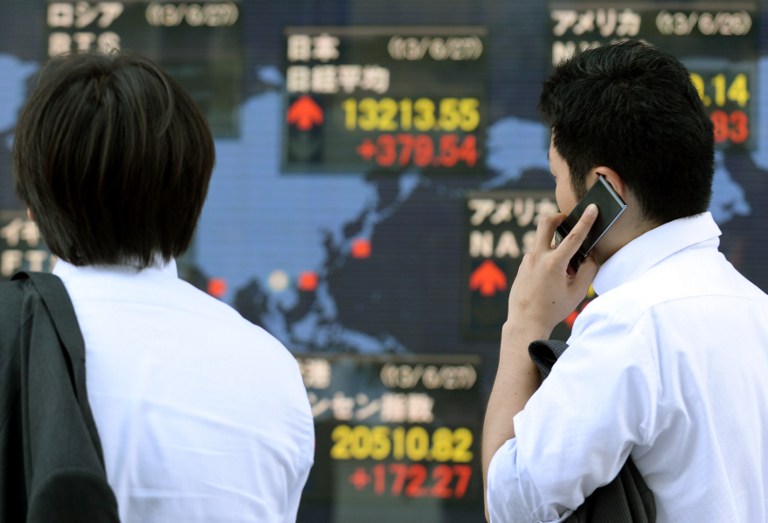Asia investors not ready to invest further despite improved confidence

illustration photo source AFP
The latest Manulife Investor Sentiment Index in Asia (Manulife ISI), based on 3,500 interviews across seven Asia markets shows an upward trend in investor sentiment in Asia, tallying with similar findings in parallel Indexes for Manulife Canada and John Hancock, Manulife’s U.S. division.
According to the survey, sentiment was positive in all markets bar Hong Kong and rising in most – dramatically so in Japan, an apparent response to ‘Abenomics’, Prime Minister Shinzo Abe’s bold plan to boost the economy. The only territory showing negative sentiment was Hong Kong.
“These Manulife ISI findings point to Asia investors warming to signs of recovery in the real economy, and that’s also reflected in our findings from North America. But many aren’t yet ready to invest further and most are holding on to too much cash, thereby effectively losing money,” said Robert A. Cook, president and CEO, Manulife Asia.
Despite the positive findings overall, there was weak linkage between sentiment and planned investment in Asia, the survey unveils. For example, in Japan investors were positive about stocks but the number planning actual investments was lower than in China and Taiwan, where sentiment was lower.
The Manulife ISI also points to a ‘barbell’ approach to investing in developed Asia markets, with investors prioritizing cash and stocks. Overall, these two asset classes were the top two product types owned and the top two financial holdings in terms of investors’ assets (excluding primary residence).
The Manulife ISI also highlighted that Asia investors are holding a lot of cash. Forty percent of respondents’ non-primary resident assets was held in cash – more than double the next highest asset types, insurance and stocks.
The Manulife ISI indicates Asia investors expect unrealistically high returns. Half those surveyed expect average annual returns on stocks of around 20 percent – double average annual returns over the past 15 years. “Investors’ equity market expectations certainly seem to be on the high side,’’ said Ronald Chan, head of Equity, Asia, Manulife Asset Management.
“Global markets, including in Asia Pacific, have become more volatile of late given the tapering of quantitative easing in the U.S. and concerns around China’s economic growth. Although the near-term direction of the broad markets will likely be dictated by macroeconomic announcements, fundamentals have improved year-on-year and there are abundant opportunities in the equity markets at the sector and stock level for investors.”
What the stars mean:
★ Poor ★ ★ Promising ★★★ Good ★★★★ Very good ★★★★★ Exceptional
Latest News
More News
- Vietnamese businesses diversify amid global trade shifts (February 03, 2026 | 17:18)
- Consumer finance sector posts sharp profit growth (February 03, 2026 | 13:05)
- Vietnam and US to launch sixth trade negotiation round (January 30, 2026 | 15:19)
- NAB Innovation Centre underscores Vietnam’s appeal for tech investment (January 30, 2026 | 11:16)
- Vietnam moves towards market-based fuel management with E10 rollout (January 30, 2026 | 11:10)
- Vietnam startup funding enters a period of capital reset (January 30, 2026 | 11:06)
- Vietnam strengthens public debt management with World Bank and IMF (January 30, 2026 | 11:00)
- PM inspects APEC 2027 project progress in An Giang province (January 29, 2026 | 09:00)
- Vietnam among the world’s top 15 trading nations (January 28, 2026 | 17:12)
- Vietnam accelerates preparations for arbitration centre linked to new financial hub (January 28, 2026 | 17:09)
















 Mobile Version
Mobile Version